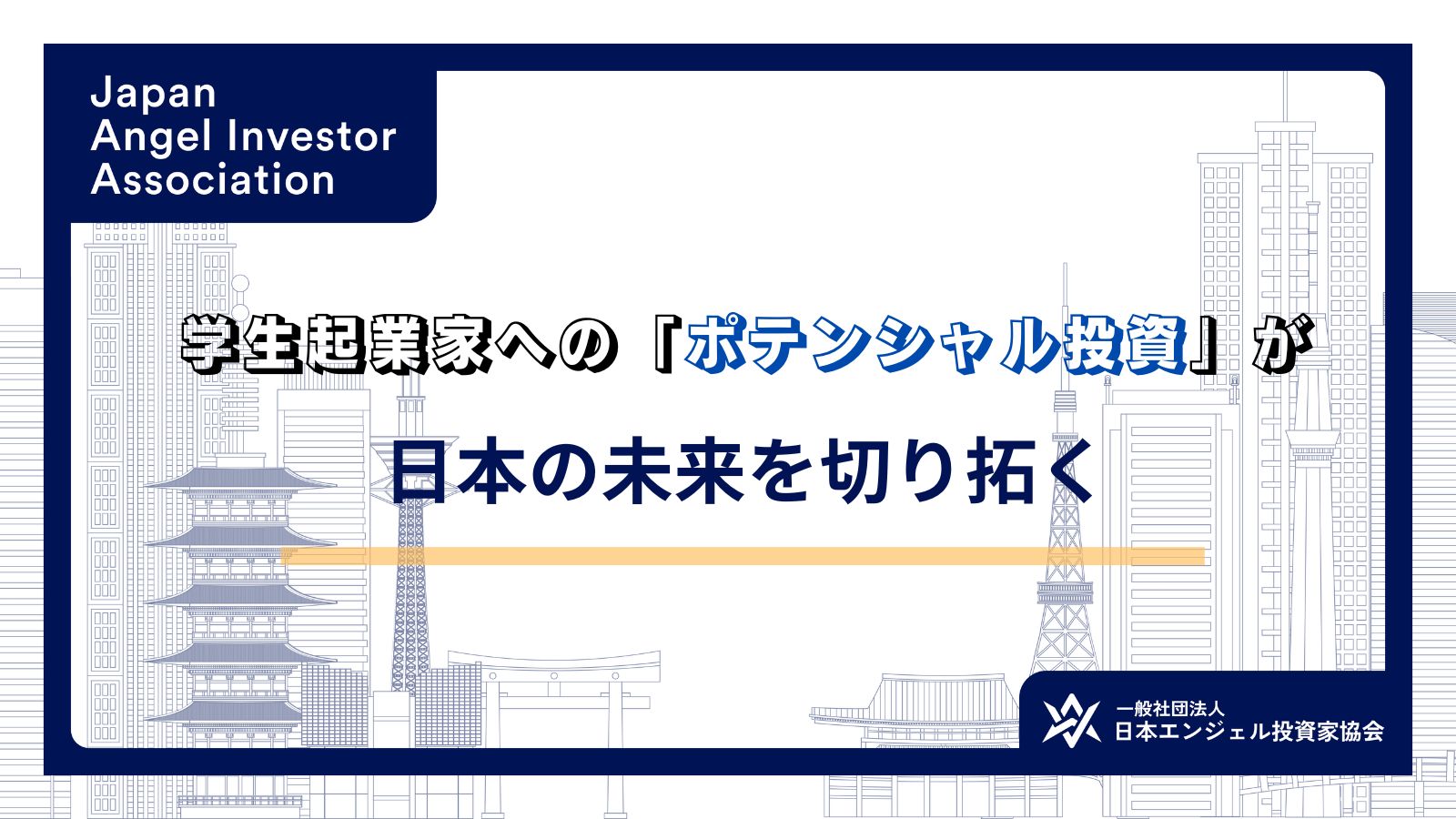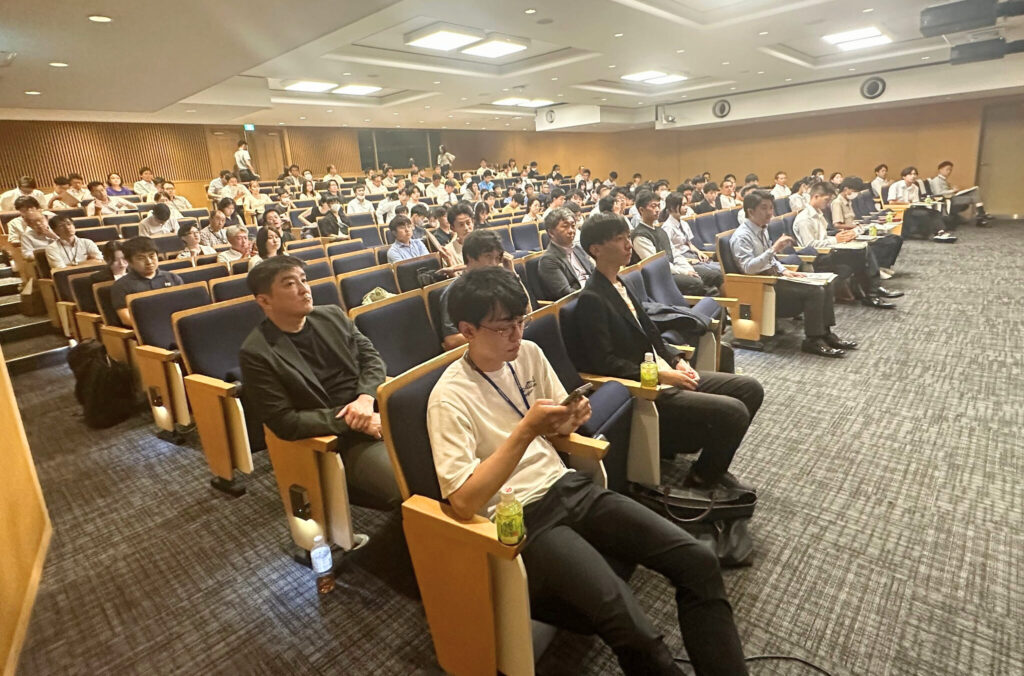

2024.9.30
Column

Our association is dedicated to nurturing Japan’s angel investment ecosystem and driving the growth of startups across the country. Every month, we provide updates on our activities, share the latest news, and report on pitch events, offering a range of insights into the world of angel investing.
Globally, there is a growing wave of entrepreneurship among younger generations, and in Japan, young entrepreneurs are seen as a powerful force to help shape the nation’s future. Student-driven business creation, in particular, is marked by an infusion of fresh ideas and innovation. Seasoned business leaders and investors are actively supporting these young founders, working to unlock their potential. This article delves into the potential of student entrepreneurs as the next generation of leaders and highlights the importance of fostering their growth.
Interest in student entrepreneurship is rising in Japan. According to a 2023 survey by the Japan Finance Corporation, nearly 5% of university and graduate students have a strong interest in entrepreneurship—1.5 times the number from the previous year. This trend reflects a desire among young people to step up as leaders amidst societal shifts. Additionally, around 40% of entrepreneurs in their 20s are working on developing new services and products within the IT and technology sectors.
*Source: Ministry of Economy, Trade, and Industry, “Survey on Entrepreneurship Awareness and Support for Youth.”
As digital natives, these students seamlessly integrate new methods like social media marketing, cloud-based management, and data analysis into their businesses. For example, gathering real-time customer insights via social media and quickly adjusting services in response exemplifies their ability to pivot faster than traditional companies. Our association sees incredible potential in these students’ flexible thinking, curiosity, and original ideas, and we look forward to watching them grow as the future leaders of Japan’s business world.
Furthermore, starting a business before entering the workforce fosters a fearless, challenge-oriented spirit, laying a foundation for future leadership. While Japanese culture often stigmatizes failure, promoting a growth-oriented view of failure could lead to greater flexibility in Japan’s economy and society, creating fertile ground for innovation. Thus, the growth of student entrepreneurs holds significant value for Japanese society.
At our association, we define “potential investment” as a strategy to support early-stage ventures with promising futures by providing funding and resources. When angel investors make potential investments, student entrepreneurs receive both financial support and business guidance, which becomes invaluable as they progress in their entrepreneurial journey.
While investing in student entrepreneurs entails risk, the value lies in their growth process, which has the potential to yield substantial returns in the long term. In the United States, data shows that over 30% of young entrepreneurs who received potential investments continue their businesses five years later, with 15% generating annual revenue exceeding 100 million yen. This underscores the critical role of angel investors and venture capital in supporting startup growth.
For student entrepreneurs in the early stages and facing limited personal funds, investment can be a significant motivator, encouraging them to pursue their vision. Given that over half of startups in Japan struggle with fundraising, the presence of potential investments will become increasingly important.
*Source: National Venture Capital Association, “NVCA 2022 Yearbook”
*Source: Japan Finance Corporation, “Entrepreneurial Realities Survey.”

Lecture to 100 high school students who want to start their own businesses at Kyoto University
Successful student entrepreneurs need more than just capital. Practical advice and management support are essential, and experienced small business owners often fulfill this role. According to a report from the Ministry of Economy, Trade, and Industry, over 70% of Japanese startups regard management support and networking, alongside funding, as critical to growth.
Small business owners, with their hands-on experience, offer student entrepreneurs practical insights—like budgeting, cash flow management, and leadership skills—that are instrumental to success. Additionally, leveraging the networks that business owners have developed enables student entrepreneurs to find reliable partners and customers.
Studies abroad also reveal that entrepreneurs with mentors are nearly twice as likely to sustain their businesses compared to those without. Thus, long-term mentorship and support in areas like business strategy and marketing are crucial for the growth of student entrepreneurs, contributing not only to their success but also to national progress.
*Source: Kauffman Foundation, “Mentorship in Entrepreneurship.”
As outlined above, angel investors are not mere providers of capital but serve as mentors in a founder’s growth journey. A 2022 survey showed that around 60% of startups receiving angel support achieved profitability within three years, demonstrating the positive impact of angel investment on business growth. For student entrepreneurs to sustain their businesses, advice backed by experience and expertise is indispensable.
Our association hosts study sessions and networking events that allow student entrepreneurs to engage directly with angel investors, refining their business plans. Additionally, by promoting networking among angel investors, we aim to share knowledge and resources, creating a safe environment where student entrepreneurs can pursue their ideas with confidence. Enabling young entrepreneurs to freely experiment with ideas and undertake new challenges is, in our view, the mission of angel investors.
Through these support initiatives, our association is committed to strengthening the foundation for young entrepreneurs to confidently shape the future. We believe that supporting student entrepreneurs holds the key to fostering innovation in Japan and will continue to accompany them on their growth journeys.
*Source: Japan Venture Capital Association, “2022 Venture Capital Market Survey.”
Supporting student entrepreneurs to reach IPO status is indeed a challenging “advanced-level angel investment,” yet it’s also one of the most rewarding phases in which support is critical. IPO success not only brings a high return on investment but also represents the ultimate goal for angel investors.
Despite the presence of talented students nationwide, the resources for creating startups—talent, funding, information—are still highly concentrated in Tokyo, creating disadvantages for promising student entrepreneurs in regional areas. The Japan Angel Investors Association aims to rectify this imbalance, starting by establishing environments in the Kansai region that offer student entrepreneurs the same opportunities as those in Tokyo.

Zoom mentoring for high school and college student entrepreneurs